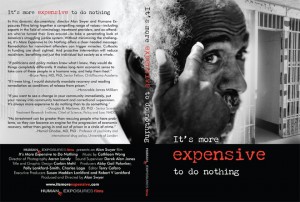HUMANE EXPOSURES films is proud to announce that It’s More Expensive to Do Nothing, our documentary about the flaws in our penal system and their possible solutions, has taken second place at the Bayou City Inspirational Film Festival (BCIFF) in Houston, TX.
We would like to thank everyone who has attended the festival, and everyone who has shown us support so far! Each one of you is an important part of the process as we work towards change, so thank you all!
The BCIFF is presented by the PROGRESS Arts Group, a nonprofit arts and education organization. Here is a little bit about the festival:
The Bayou City Inspirational Film Festival (BCIFF) was founded by its executive director, Shanda Davis, to showcase diverse film and video projects that:
* Educate and enlighten us on political, social, psychological, economic, health, religious, and a variety of other issues,
* Offer hope and encouragement as well as inspire us to contribute towards the betterment of society and
* Display positive relationships, morals, individual, and family values.
The Bayou City Inspirational Film Festival’s mission is:
* To provide a viable platform for independent filmmakers and artists from around the world to showcase their works,
* To provide awareness to the world about the variety of educational, inspirational and positive works available and the need to integrate more of these types of works into society,
* To provide a networking platform for filmmakers and industry professionals and
* To showcase the artistic excellence of children & youth in Houston and surrounding areas and provide scholarships to assist them in furthering their arts education.
For those of you who have yet to see the film, here is the trailer:
If our film hit home, or even if you just have an interest in this issue, please take a moment and share it with a few of your friends. The wider audience we can reach the better chance we have of not only alleviating the trials of those stuck in the vicious cycle, but also doing it in a way that reduces the cost to society and government. It truly is much more expensive to do nothing!
Source: “The Bayou City Inspirational Film Festival,” BCIFF Website
Image copyright Susan Madden Lankford, from the HUMANE EXPOSURES films documentary “It’s More Expensive to Do Nothing.” Used with permission.
Visit Us on Facebook: Humane Exposures Publishing, downTownUSA, Maggots in My Sweet Potatoes, It’s More Expensive To Do Nothing.


 The Newburyport Documentary Film Festival, now in its third year, presents 20 films. Three judges will rate the films in a number of juried categories, and, in addition, an audience-adjudicated award will also be given.
The Newburyport Documentary Film Festival, now in its third year, presents 20 films. Three judges will rate the films in a number of juried categories, and, in addition, an audience-adjudicated award will also be given. Questions of abuse and neglect are the tricky ones. Just like so many issues in life, they are vastly more complex than they seem at first. In the case of the children, whose bodies and brains are constantly developing, these complexities can span a broad array or disciplines.
Questions of abuse and neglect are the tricky ones. Just like so many issues in life, they are vastly more complex than they seem at first. In the case of the children, whose bodies and brains are constantly developing, these complexities can span a broad array or disciplines.







